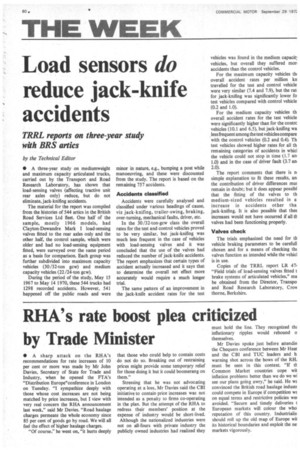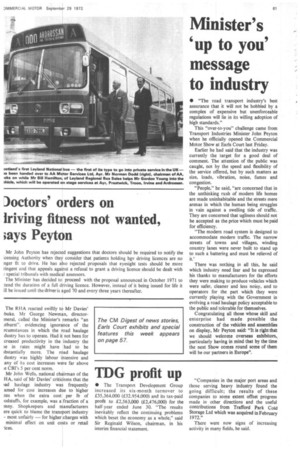RHA's rate boost plea criticized by Trade Minister
Page 344

Page 345

If you've noticed an error in this article please click here to report it so we can fix it.
• A sharp attack on the RHA's recommendations for rate increases of 10 per cent or more was made by Mr John Davies, Secretary of State for Trade and Industry, when he opened the FTA's "Distribution Europe"conference in London on Tuesday. "I sympathize deeply with those whose cost increases are not being matched by price increases, but I view with very real concern the RHA announcement last week," said Mr Davies. "Road haulage charges permeate the whole economy since 85 per cent of goods go by road. We will all feel the effect of higher haulage charges.
"Of course," he went on, "it hurts deeply that those who could help to contain costs do not do so. Breaking out of restraining prices might provide some temporary relief for those doing it but it could boomerang on them."
Stressing that he was not advocating operating at a loss, Mr Davies said the CBI initiative to contain price increases was not intended as a penalty to firms co-operating in the plan. But the attempt of the RHA to redress their members' position at the expense of industry would be short-lived. Although the nationalized industries were not on all-fours with private industry the publicly owned industries had realized they must hold the line. They recognized tin inflationary ripples would rebound o themselves.
Mr Davies spoke just before attendin the Chequers conference between Mr Heat and the CBI and TUC leaders and h warning shot across the bows of the RH, must be seen in this context. "If ti Common Market countries cope wit inflation problems better than we do we wi see our plans going awry," he said. He va convinced the British road haulage indust could compete in Europe if competition wl on equal terms and restrictive policies wet avoided. "Secure and timely deliveries I European markets will colour the who reputation of this country. Industrialis should roll up the old map of Europe wii its historical boundaries and exploit the ne markets vigorously.
The RI-IA reacted swiftly to Mr Davies' ;buke. Mr George Newman, directormeral, called the Minister's remarks "an itburst", evidencing ignorance of the rcumstances in which the road haulage dustry has to operate. Had it not been for creased productivity in the industry the se in rates might have had to be ibstantially more. The road haulage dustry was highly labour intensive and any of its cost increases were far above le CBI's 5 per cent norm.
Mr John Wells, national chairman of the HA, said of Mr Davies' criticisms that the )ad haulage industry was frequently amed for cost increases due to higher les when the extra cost per lb of iodstuffs, for example, was a fraction of a !nny. Shopkeepers and manufacturers ere quick to blame the transport industry most unfairly — for higher charges with minimal effect on unit costs or retail -ices.
































































































































































































































































































































































































































































































































